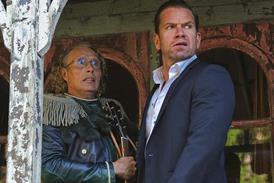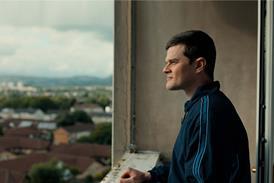Dir/scr: Larry Clark. US.2005. 111mins.
In Wassup Rockers,Larry Clark has produced the sweetest, most loving and lovable film he's evermade - and consequently the most boring. If kids (now 10-years-old) wasdeplorable, frightening, and, to some, even degrading, it was always excitingand its hateful, rapacious teenage male lead endlessly fascinating.
In his latest film Clark hasdiscovered a band of adorable Latino teenagers from the barrio of South CentralLA and, following them in their rather benign escapades on skateboards,proceeds to re-invent neo-realism yet once more.
Clark has a built-inaudience around the world and has successfully branded himself in a veryexplicit way. However, distributors and audiences looking for teenage skin andsex, trademarks of the Clark oeuvre, should be warned that, for better orworse, this latest production contains only a tiny bit of the former and noneof the latter. Sales so far include to Accent (Australia).
To give credit where it isdue, the film does have a certain energy, propelled as it is throughout by apounding, mostly punk rock score that accompanies the regular punctuation ofseven Latino boys flying off on their skateboards, boarding a bus, fleeing thepolice, and so on.
The lead, 13-year-oldJonathan (Velasquez) is beautiful and charming and holds the screen well (as istypical for a Clark film, he is usually seen naked from the waist up).
But the endless rap sessionsthat these nearly angelic, picked-on guys indulge in lead nowhere, are not veryfunny and give the audience a lot less insight into their lives than Clarkseems to think they do.
The worst aspect, though, isthat while Clark invests the kids with an obviously sacrosanct authenticity,virtually every other character in the film, whether by accident or design, isa complete parody.
The Beverly Hills cop thatharasses them is completely unconvincing (like the dialogue he is given), as isthe drunken rich lady and predatory gay photographer whose luxurious groundsand mansions the boys accidentally barge into.
At the end of these lattertwo scenes, in which these caricatures prey on the boys, Clark has the drunkenrich lady tumble into a bathtub to be electrocuted, while the gay photographerfalls down his stairs to his apparent death. Either it's a dollop of surrealismor an expression of ersatz socialist vigilante justice.
The generally carefree toneis also suddenly (and unconvincingly) shattered when a film director who is adead ringer for Clint Eastwood shoots and kills one of the kids who hastrespassed on his property. Insider joke or mean-spirited barb at a famousHollywood conservative'
The most surreal aspect ofthe boys' foray into Beverly Hills comes when two gorgeous young prep schoolgirls approach them - seven Hispanic kids from the ghetto - and salaciouslyinvite them to their mansion, implicitly promising sex.
Even more ridiculous is thescene in which the girls' preppy boyfriends - dressed in coats and ties, noless - proceed to beat up the ghetto kids. Clark seems so anxious for us tolove these kids uncompromisingly that he seems willing to move to anotherplanet.
It could be that he is justhaving some fun here, through a kind of perverse wish-fulfilment fantasy, butif so, it clashes fatally with the documentary realism he is at great pains toestablish in the rest of the film.
Worst of all, the 'realism'itself only feels real in flashes and rarely moves beyond what we already know,or at least what we should know. Maybe Clark's intended audience are viewerswho still don't know Hispanic ghetto kids are people too. Possibly he should atleast be given good marks for that.
Production company
Glass Key
International sales
TF1 International
Executive producer
Sharon Stone
Producers
Henry Winterstein
Kevin Turen
Larry Clark
Cinematography
Steve Gainer
Editor
Alex Blatt
Production design
John Demeo
Music
Harry Cody
Main cast (as themselves)
Jonathan Velasquex
Francisco Pedrasa
Milton Velasquez
Usvaldo Panameno
Eddie Velasquez
Luis Roja Salgado
Carlos Ramirez















![[Clockwise from top left]: Paul Thomas Anderson, Chloe Zhao, Ryan Coogler, Park Chan-wook](https://d1nslcd7m2225b.cloudfront.net/Pictures/274x183/9/0/0/1467900_writerdirectors_192733.jpg)


No comments yet